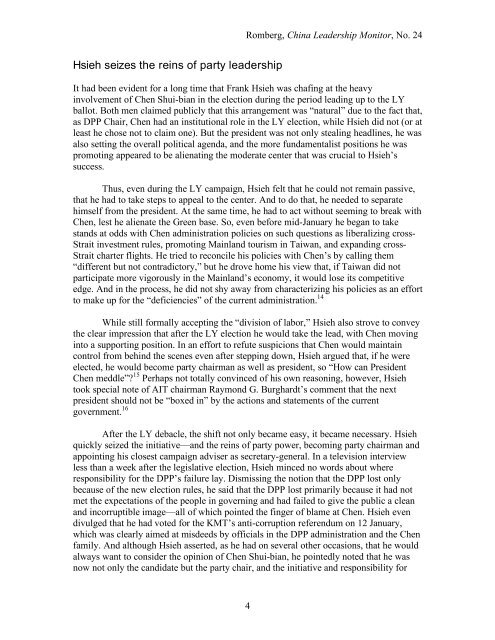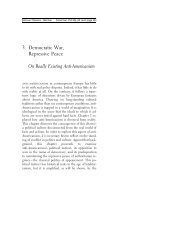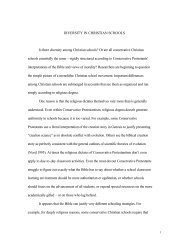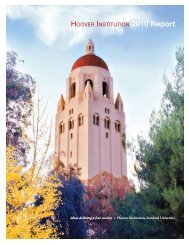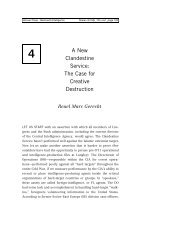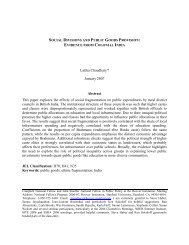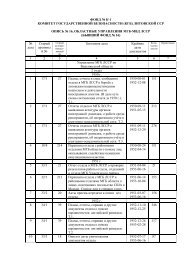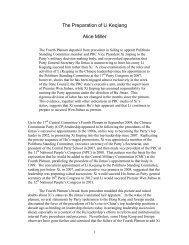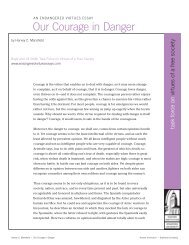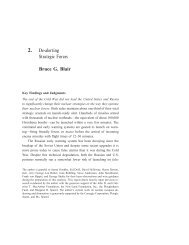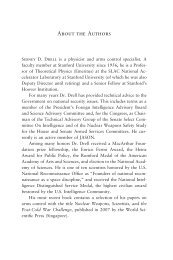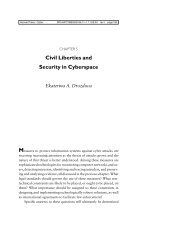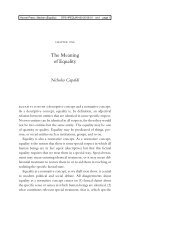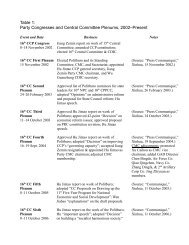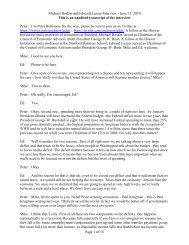Taiwan Elections: Foundation for the Future - Hoover Institution
Taiwan Elections: Foundation for the Future - Hoover Institution
Taiwan Elections: Foundation for the Future - Hoover Institution
You also want an ePaper? Increase the reach of your titles
YUMPU automatically turns print PDFs into web optimized ePapers that Google loves.
Hsieh seizes <strong>the</strong> reins of party leadership<br />
Romberg, China Leadership Monitor, No. 24<br />
It had been evident <strong>for</strong> a long time that Frank Hsieh was chafing at <strong>the</strong> heavy<br />
involvement of Chen Shui-bian in <strong>the</strong> election during <strong>the</strong> period leading up to <strong>the</strong> LY<br />
ballot. Both men claimed publicly that this arrangement was “natural” due to <strong>the</strong> fact that,<br />
as DPP Chair, Chen had an institutional role in <strong>the</strong> LY election, while Hsieh did not (or at<br />
least he chose not to claim one). But <strong>the</strong> president was not only stealing headlines, he was<br />
also setting <strong>the</strong> overall political agenda, and <strong>the</strong> more fundamentalist positions he was<br />
promoting appeared to be alienating <strong>the</strong> moderate center that was crucial to Hsieh’s<br />
success.<br />
Thus, even during <strong>the</strong> LY campaign, Hsieh felt that he could not remain passive,<br />
that he had to take steps to appeal to <strong>the</strong> center. And to do that, he needed to separate<br />
himself from <strong>the</strong> president. At <strong>the</strong> same time, he had to act without seeming to break with<br />
Chen, lest he alienate <strong>the</strong> Green base. So, even be<strong>for</strong>e mid-January he began to take<br />
stands at odds with Chen administration policies on such questions as liberalizing cross-<br />
Strait investment rules, promoting Mainland tourism in <strong>Taiwan</strong>, and expanding cross-<br />
Strait charter flights. He tried to reconcile his policies with Chen’s by calling <strong>the</strong>m<br />
“different but not contradictory,” but he drove home his view that, if <strong>Taiwan</strong> did not<br />
participate more vigorously in <strong>the</strong> Mainland’s economy, it would lose its competitive<br />
edge. And in <strong>the</strong> process, he did not shy away from characterizing his policies as an ef<strong>for</strong>t<br />
to make up <strong>for</strong> <strong>the</strong> “deficiencies” of <strong>the</strong> current administration. 14<br />
While still <strong>for</strong>mally accepting <strong>the</strong> “division of labor,” Hsieh also strove to convey<br />
<strong>the</strong> clear impression that after <strong>the</strong> LY election he would take <strong>the</strong> lead, with Chen moving<br />
into a supporting position. In an ef<strong>for</strong>t to refute suspicions that Chen would maintain<br />
control from behind <strong>the</strong> scenes even after stepping down, Hsieh argued that, if he were<br />
elected, he would become party chairman as well as president, so “How can President<br />
Chen meddle”? 15 Perhaps not totally convinced of his own reasoning, however, Hsieh<br />
took special note of AIT chairman Raymond G. Burghardt’s comment that <strong>the</strong> next<br />
president should not be “boxed in” by <strong>the</strong> actions and statements of <strong>the</strong> current<br />
government. 16<br />
After <strong>the</strong> LY debacle, <strong>the</strong> shift not only became easy, it became necessary. Hsieh<br />
quickly seized <strong>the</strong> initiative—and <strong>the</strong> reins of party power, becoming party chairman and<br />
appointing his closest campaign adviser as secretary-general. In a television interview<br />
less than a week after <strong>the</strong> legislative election, Hsieh minced no words about where<br />
responsibility <strong>for</strong> <strong>the</strong> DPP’s failure lay. Dismissing <strong>the</strong> notion that <strong>the</strong> DPP lost only<br />
because of <strong>the</strong> new election rules, he said that <strong>the</strong> DPP lost primarily because it had not<br />
met <strong>the</strong> expectations of <strong>the</strong> people in governing and had failed to give <strong>the</strong> public a clean<br />
and incorruptible image—all of which pointed <strong>the</strong> finger of blame at Chen. Hsieh even<br />
divulged that he had voted <strong>for</strong> <strong>the</strong> KMT’s anti-corruption referendum on 12 January,<br />
which was clearly aimed at misdeeds by officials in <strong>the</strong> DPP administration and <strong>the</strong> Chen<br />
family. And although Hsieh asserted, as he had on several o<strong>the</strong>r occasions, that he would<br />
always want to consider <strong>the</strong> opinion of Chen Shui-bian, he pointedly noted that he was<br />
now not only <strong>the</strong> candidate but <strong>the</strong> party chair, and <strong>the</strong> initiative and responsibility <strong>for</strong><br />
4


